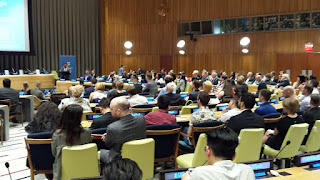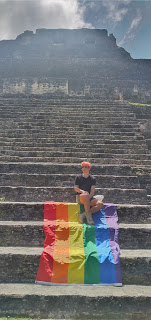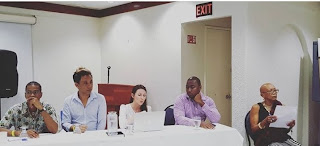UniBAM LGBT Advocacy in the North vs The South: The Struggle for Harmonization
9th September, 2014
The announcement that Colombia, Uruguay and Chile will introduce a SOGI resolution through the Human Rights Council at the Global level complements efforts like South Africa, Norway and Brazil in the pass and complements the UN resolution on Extrajudicial killings. Talks about engaging the Commonwealth system to advance the decriminalisation process and the success of Africans in their pursuit of getting approved, a resolution on violence and the tremendous success at the OAS since 2008 to advance systems specifically, and LGBT rights in particular, can be summed up in one sentence. Improved policy norming through political engagement on L.G.B.T rights as human rights is getting better. However, the harmonization at the Global level into regional and national responses have not translated well in clear resource support, accessing regional systems, cultivating activists in the South and building leadership at the grassroots level.
UniBAM had the chance to attend a Global meeting at Wilton Park, in London to refined understanding of policy engagements and learned that there was a discussion to look at L.G.B.T rights advancement as a development issue, that strategies defer from country to country, that some global organization believe in decriminalization as a strategy was a top priority, that international organizations are using platform issues to build coalition and support at the UN Commission on the Status of Women, at the MDG's negotiations, in Small Island Development negotiations, through the International Conference on Population and Development.


The announcement that Colombia, Uruguay and Chile will introduce a SOGI resolution through the Human Rights Council at the Global level complements efforts like South Africa, Norway and Brazil in the pass and complements the UN resolution on Extrajudicial killings. Talks about engaging the Commonwealth system to advance the decriminalisation process and the success of Africans in their pursuit of getting approved, a resolution on violence and the tremendous success at the OAS since 2008 to advance systems specifically, and LGBT rights in particular, can be summed up in one sentence. Improved policy norming through political engagement on L.G.B.T rights as human rights is getting better. However, the harmonization at the Global level into regional and national responses have not translated well in clear resource support, accessing regional systems, cultivating activists in the South and building leadership at the grassroots level.
UniBAM had the chance to attend a Global meeting at Wilton Park, in London to refined understanding of policy engagements and learned that there was a discussion to look at L.G.B.T rights advancement as a development issue, that strategies defer from country to country, that some global organization believe in decriminalization as a strategy was a top priority, that international organizations are using platform issues to build coalition and support at the UN Commission on the Status of Women, at the MDG's negotiations, in Small Island Development negotiations, through the International Conference on Population and Development.
These documents and initiatives, however, depends on trick-down policy strategy and are created and approved in an environment where LGBT advocates may work in weak regional and national responses with little or no resources to give life to these efforts, where rights enforcement and protection mechanism are insufficient, where civil society organizations are not always rushing to the side of the LGBT community to advocate for hate crime and hate speech legislation, where governments are not rushing to lead in approving anti-discrimination protection, where not every region and country in the world has a a strong LGBT organization, where free media maybe a big problem in some countries in the South and where LGBT advocates are not always rushing to be visible as fundamentalism rears its ugly head to oppose concerns.
The next discovery at these meeting is that knowledge mobilisation has value in the hands of an advocate who has a clear vision to advance social change. When technical persons who can do socio-economic research on the cost of discrimination mesh with funders, activists on the ground,political leaders with experience in the international community and can share strategies about building support and coalition. It all has a long-term value in institutional strengthening, driving evidence--base advocacy. Knowledge mobilisation is a long-term investment in institution-building that can affect all citizens when done right.
The Word Conference in Toronto is an example of creating a knowledge mobilisation space to share regional and national responses to an audience not familiar with activists work on LGBT issues in the South. Belize, India, Uganda, Bostwana, Kenya showed up at the Envisioning conference along with their Caribbean counterparts who had their own forum discussion at Yverson University. What we have learn in Belize is that only the LGBT community can tell their story that incorporate human dignity with resistance. Of note, Belize had exactly 5 seconds to prepare its presentation on its OAS experience, leveraging its decriminalisation experience as its response to the far right in Belize and the currently evolving CFLAGS brewing in the Caribbean region. We had two other panels at the world conference on Story telling and our decriminalisation work. We had never represented so well and for the first time at the Toronto World Pride Conference in June of this year.


What is clear, is Belize is taking advantage of its international spaces to educate the international community about its LGBT challenges and evolving national tone, as UniBAM awaits the Supreme Court decision. Along the way, learning that public education nationally has equal value as it does internationally to galvanise support, reshape institutional knowledge and rebuilding national reputation. Belize was also represented at a Human Dignity Trust meeting in London, on September 4th that allowed a sharing of ideas about our internet campaign, our responses in building public support through our wristband distribution and conducting research on our opponents. A process proving, where supporters will not show up at a large protest, they will show support through symbolism and social media.
The harmonization effort internationally, is affected and driven by activists who do takes advantage of international, hemispheric, regional and national mechanisms, understanding that personal security will be challenged, political mapping important, but resource mobilization essential. Harmonization is opportunistic, sometimes narrow in scale and guided by facilitators, cultivators. donors and activists who shape responses according to need. The struggle will be to understand that activism is under pressure in the South to move faster, as marriage equality advances and merged with a basic desire for social and economic protection in a way that seems menacing by the far right. What we know is that L.G.B.T advancement is affected by corruption in Africa, political resistance in the Caribbean, L.G.B.T leadership capacity and visibility. What will the national landscape look like in Belize after the Supreme Court decision? How will the region respond? We simply don't know!







Comments
Post a Comment